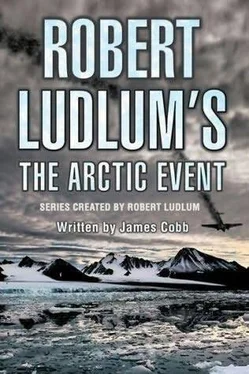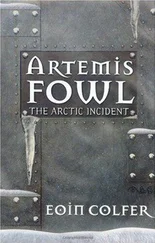The idea flared behind her eyes, “In fact, with the components of this crash and the TU-4 that’s on static display at the Gagarin Institute, I’ll wager we could assemble one complete airworthy aircraft.”
She turned to face Smyslov, suddenly as excited as a schoolgirl with a new bicycle. “You’ve been to the Institute! You’ve seen the Bull they have in the air museum there! What do you think?”
The Russian officer looked up, bemused. “I really wouldn’t know, Professor, but I’m sure it would take a great deal of money.”
“You leave the fund-raising to me, Gregori! I know of a number of wealthy war bird fanatics who would give an arm and a leg to see the Fifi, the Commemorative Air Force’s Superfortress, doing a joint flyover with a genuine Russian B-29-ski. Champlain alone would be good for at least a quarter of a million!”
Smith couldn’t help but be impressed with her vibrant enthusiasm. Valentina Metrace obviously was a cobbler who stuck to her last. He whistled softly and aimed a thumb forward toward the bomb bays. “I’m afraid we still have certain other priorities here.”
Valentina waved a hand arily. “Details, details! I don’t care what breed of germ we might have to tidy up. No one is casually putting the torch to this aircraft if I have anything to say about it. This is history!”
“That will be for the powers that be to decide, Val,” Smith smiled. “Not me, I’m very pleased to say.”
Smyslov looked over his shoulder at Smith, his expression intent. “What do we do next, Colonel?”
“We know the anthrax exists and is still a factor, so reporting that is our priority.” Smith set the empty canteen cup on the deck. “Tomorrow morning, if we have decent weather, I intend to make one fast sweep around the crash site to look for the survival camp of the Misha’s crew. Then we hike for the science station. If we can’t make radio contact with the outside from the station, then I’ll send Randi back to the cutter in the helicopter to report.”
Smith studied Smyslov’s back as the Russian unrolled his sleeping bag in the crew bunk. “I’m also going to commit the reinforcement group and secure the island, Major. That’s going to mean bringing the Canadians on board, and a general escalation of the whole scenario. I know we promised your government that we’d try and keep this low-key, but now, with both the anthrax and the disappearance of the station staff to contend with, we may have no choice but to go overt.”
“I fully understand, Colonel. There is indeed no choice.”
Smyslov’s reply was unexpressive, and Smith had to wonder if the Russian was speaking in agreement with his words or with some thought of his own.
“Ah, me! That’s all for tomorrow’s worry list,” Valentina said, glancing toward the hatch set in the rear bulkhead. “In the meantime, there is something else I need to have a look at.”
“Can’t it wait until morning?” Smith asked.
She looked toward Smith so the minute tilt of her head and the lift of her eyebrow would be masked from Smyslov. “It’s nothing really. Shan’t take a second.”
Catching up a flashlight, she got to her feet and moved aft. Undogging the pressure door, she ducked low through it. Assorted thumps and bangs followed as she worked toward the very tail of the aircraft, followed by a few minutes of involved silence. “Now, this is interesting,” her voice reverberated with a metallic hollowness. “Jon, could you please give me a hand back here for a second?”
“On my way.” Smith followed Valentina into the dark of the passage. The historian was crouching on the gangway between the stinger turret’s ammunition magazines. With her flashlight aimed at her face, she silently mouthed the words “Shut the hatch.”
“Damn, Val. Were you raised in a barn! It’s even colder out here.” He pulled the pressure door closed and twisted the dogging lever to the locked position. Moving back to the magazines, he sank down on one knee beside Valentina. She was turning a wicked-looking autocannon shell over and over in her gloved fingers.
“What’s that?” Smith inquired over the whine of the wind playing around the tail surfaces.
“A Soviet 23mm round. From the tail gun belts,” she replied.
“All right. What’s going on?”
“Something odd, Jon. Things aren’t adding up, or rather, they’re adding up in a very peculiar way. That’s why I cut you off up in the cockpit this afternoon.”
“I thought as much,” he replied. “What are you seeing?”
“This airplane was fully outfitted for combat. In addition to having its anthrax warload aboard, its defensive armament was also fully charged. Furthermore, this plane didn’t make an emergency landing here. This was an accidental crash.”
Smith wasn’t quite sure of the differentiation. “Are you sure?”
“Quite. The bomber wasn’t configured for an emergency landing when it hit the ice. Remember when I asked about the propeller and fuel mixture controls in the cockpit? They had been left at their cruise settings. Also, I asked about the flap lever. The wing flaps hadn’t been lowered, as would have been done for any kind of a deliberate landing.”
Valentina rapped the top of the magazine housing with her knuckles. “Finally they didn’t eject the gun turret ammunition magazines. In a B-29 Superfortress or a TU-4 Bull, that would be a standard procedure in a ditching or emergency landing scenario.”
“Then what the hell did happen?”
“As I said, a freak crash, a total accident,” she continued. “According to the maps of Wednesday Island, this glacier has a gradual descending gradient toward the north. The bomber must have come in from the North. They also must have been coming in at night, flying low and on instruments because they never knew the island was here. They came in between the peaks, and the terrain rose up underneath the aircraft. Before the pilots realized what was happening they struck the ground, or rather the ice. They must have been traveling at full cruising speed, way too fast for a conventional landing, but as fate would have it, the glacier’s surface at that time must have been comparatively smooth, without any ledges or crevasses to trip the aircraft. So they hit flat and skidded cleanly.
“There have been similar crashes in the Arctic and Antarctic,” she continued in her whisper, “when aircrews have lost situational awareness in whiteout conditions. To put a bottom line on this, this aircraft was not in an emergency state when it went down. They weren’t lost, and they weren’t landing. They were in a controlled cruise configuration, bound for somewhere else.”
“If that’s the case, wouldn’t they have seen the island on their charts?” Smith asked.
“You have to remember that in 1953 detailed navigational information on this part of the world was all but nonexistent. The closest thing to an accurate chart was an American military secret. Wednesday Island is also something of a freak. It’s one of the highest points within the Queen Elizabeth Archipelago. At that time, whoever plotted this plane’s course had no idea that a bloody great mountain would be parked out here in the middle of the Arctic Ocean.”
“It’s not all that much of a mountain,” Smith mused. “We’re only about twenty-five hundred feet above sea level here. Wouldn’t that be a pretty low cruising altitude for a pressurized aircraft like this one?”
“Very much so,” she agreed. “In fact, a TU-4 or B-29 would only follow such a low flight profile for one reason: if its crew were worried about being picked up by long-range radar.”
Jon forced himself to play devil’s advocate. “Wouldn’t they have seen the island on their own navigational radar?”
Читать дальше












